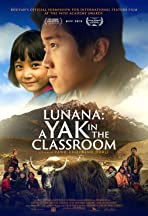The story is similar to others you have likely seen. A city boy is forced against his wishes to work in a backward rural area and eventually comes to appreciate it. Lunana, is unique in its isolation among mountains and its people who are relatively uninformed of even the rest of the country.
Ugyen Dorji lives in Thimphu, the capital and largest city in Bhutan, chomping at the bit to get to Australia where he believes he will be able to start a singing career. He offends a supervisor who decides to teach him a lesson by sending him to teach in a very remote area. His grandmother shames him into accepting.
A journey that takes over a week of arduous hiking. When he arrives he is discouraged by a lack of electricity and indoor plumbing among other factors, decides he wants to go back home, but is told the animals need rest. The next morning he is woken by a young enthusiastic girl and he decides to hang on for the moment. The facilities are very limited with no blackboard, but he uses what resources he can. The children respond and the whole village is grateful.
How does he end up with a yak in his classroom? In his spare time he likes to sing and play his guitar. A young female yak herder hears him and in turn sings for him. She tells him that to get warm the locals burn yak dung, but at first he doesn't know which pieces are best. Eventually he is gifted a yak for its dung and the only place for him to keep it is his classroom and it becomes a background for his studies. He learns the difficult song the girl sings.
He is really motivated by the idea of making a living off music and much to the regret of the people he does leave. Uygen does take some new music with him, namely the yak herder song. He does make it to Australia and sings in a bar where the yak herder song helps him pick up attention. That's it. Except it is well told.
Bhutan is a poor country, but in 1974 their king announced that Gross National Happiness is more important than Gross Domestic Product with all new laws supposed to advance this philosophy. The country has gradually been improving its standard of living.
Pawo Choyning Dorji directed, wrote and produced the film. He is the nephew of a well regarded Tibetan Buddhist film maker. He is also the son in law of Stan Lai, a Taiwanese playwright.
This film was a major challenge. They required 65 mules and 8 days carrying filming equipment plus solar panels and batteries. While filming the crew did not bathe because of the temperature. The vast majority of the cast was their first film. The villagers were all locals and most had never seen a film and were unacquainted with toothpaste when brushing teeth was one of the scenes.
Hsiao-Yun Ku has been editing since 1999. Jigme Tenzing was the cinematographer and had been handling movie cameras since 2008. The mountainous scenery added to the viewer's enjoyment. The filming was done with solar power.
Uygen was played by Sherab Dorji. As mentioned the villagers were all performed by locals, but they really lucked out with Pem Zam who played the young enthusiastic student and is the smiling girl in the background of the poster. Another noteworthy one was Kelden Lhamo Gurung who played the singing yak herder.
If you have always lived in a city this film will make you aware that rural folks are not only more relaxed, but they have their own wisdom. If you enjoy people overcoming difficulties or even if you just like mountain scenery this will be an enjoyable experience. Available on Netflix in the Dzongkha language with subtitles.

No comments:
Post a Comment